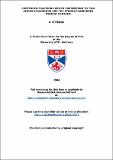Continued fractions which correspond to two series expansions and the strong Hamburger moment problem
Abstract
Just as the denominator polynomials of a J-fraction are
orthogonal polynomials with respect to some moment functional, the
denominator polynomials of an M-fraction are shown to satisfy a skew
orthogonality relation with respect to a stronger moment functional.
Many of the properties of the numerators and denominators of an M-
fraction are also studied using this pseudo orthogonality relation
of the denominator polynomials. Properties of the zeros of the
denominator polynomials when the associated moment functional is
positive definite are also considered.
A type of continued fraction, referred to as a J-fraction, is
shown to correspond to a power series about the origin and to another
power series about infinity such that the successive convergents of
this fraction include two more additional terms of anyone of the
power series. Given the power series expansions, a method of
obtaining such a J-fraction, whenever it exists, is also looked at.
The first complete proof of the so called strong Hamburger moment
problem using a continued fraction is given. In this case the
continued fraction is a J-fraction.
Finally a special class of J-fraction, referred to as positive
definite J-fractions, is studied in detail.
The four chapters of this thesis are divided into sections.
Each section is given a section number which is made up of the
chapter number followed by the number of the section within the
chapter. The equations in the thesis have an equation number
consisting of the section number followed by the number of the
equation within that section.
In Chapter One, in addition to looking at some of the
historical and recent developments of corresponding continued
fractions and their applications, we also present some preliminaries.
Chapter Two deals with a different approach of understanding
the properties of the numerators and denominators of corresponding
(two point) rational functions and, continued fractions. This
approach, which is based on a pseudo orthogonality relation of the
denominator polynomials of the corresponding rational functions,
provides an insight into understanding the moment problems. In
particular, results are established which suggest a possible type
of continued fraction for solving the strong Hamburger moment
problem.
In the third chapter we study in detail the existence
conditions and corresponding properties of this new type of continued
fraction, which we call J-fractions. A method of derivation of one
of these 3-fractions is also considered. In the same chapter we also
look at the all important application of solving the strong Hamburger
moment problem, using these 3-fractions.
The fourth and final chapter is devoted entirely to the study
of the convergence behaviour of a certain class of J-fractions,
namely positive definite J-fractions. This study also provides some
interesting convergence criteria for a real and regular 3-fraction.
Finally a word concerning the literature on continued fractions
and moment problems. The more recent and up-to-date exposition on
the analytic theory of continued fractions and their applications is
the text of Jones and Thron [1980]. The two volumes of Baker and
Graves-Morris [1981] provide a very good treatment on one of the
computational aspects of the continued fractions, namely Pade
approximants. There are also the earlier texts of Wall [1948] and
Khovanskii [1963], in which the former gives an extensive insight
into the analytic theory of continued fractions while the latter,
being simpler, remains the ideal book for the beginner. In his
treatise on Applied and Computational Complex Analysis, Henrici
[1977] has also included an excellent chapter on continued fractions.
Wall [1948] also includes a few chapters on moment problems and
related areas. A much wider treatment of the classical moment
problems is provided in the excellent texts of Shohat and Tamarkin
[1943] and Akhieser [1965].
Type
Thesis, PhD Doctor of Philosophy
Collections
Items in the St Andrews Research Repository are protected by copyright, with all rights reserved, unless otherwise indicated.

